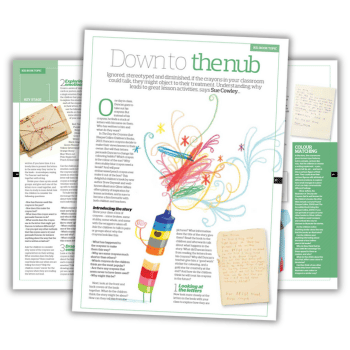Ignored, stereotyped and diminished – if the crayons in your classroom could talk, they might object to their treatment. This PDF for KS1 teachers contains ideas for your The Day the Crayons Quit planning.
This delightful children’s book by Drew Daywalt and illustrator Oliver Jeffers offers plenty of inspiration for lesson activities.
Using these The Day the Crayons Quit planning ideas, children will look at emotion cards, get creative with colours and dramatise different feelings.
What is The Day the Crayons Quit about?
One day in class, Duncan goes to take out his crayons. But instead of his crayons, he finds a stack of letters with his name on them. Who has written to him and what do they want?
In The Day the Crayons Quit (HarperCollins Children’s Books, 2013), Duncan’s crayons decide to make their views known to their owner. But will their letters persuade Duncan to change his colouring habits?
Which crayon is the colour of the sun? Why does stubby blue crayon need a break? And will poor embarrassed peach crayon ever make it out of the box?
Starter activity
Show your class a box of crayons – some broken, some stubby, some whole, and some with the wrappers taken off.
Ask children to talk in pairs or groups about why the crayons look like this:
- What has happened to the crayons to make them this way?
- Why are some crayons much shorter than others?
- Which crayons do the children think are the most popular?
- Are there any crayons that seem never to have been used?
- Why might this be?
Next, look at the front and back covers of The Day the Crayons Quit. What do children think the story might be about? How can they tell this from the pictures? What information does the title of the story give them?
Read The Day the Crayons Quit to the children. Afterwards talk about what happens in the story. What did Duncan learn from reading the letters from his crayons? Why did Duncan’s teacher give him a “good work” sticker for colouring, and a gold star for creativity at the end?
How do children think he will treat his crayons in the future?
Sue Cowley is an experienced teacher, author and presenter. Visit suecowley.co.uk to find out more.














